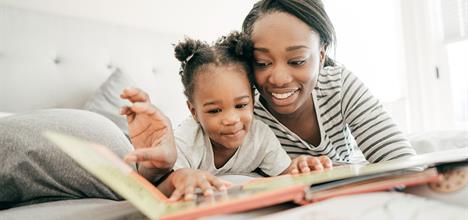Some parents choose to read to their newborns even before they can hold their heads up or focus their eyes on the pages. We occasionally hear of those who start even sooner—reading to their unborn children through uterine walls.
Our take on this head start? Although babies are thought to be able to hear well before they are born, we wouldn't count on it making your baby significantly smarter or more well-read. If you enjoy it, though, by all means, read away in anticipation of the day when your baby will be able to join in on the fun more actively.
The good news is you won't have to wait too long. Just as there are well-defined and eagerly anticipated "motor" milestones that include rolling (4 to 6 months), sitting (7 to 9 months), and walking (anywhere from 9 to 15 months), there are equally well-defined and important milestones of early literacy.

-
Around 3 months: Let the games begin. Your baby will begin to babble and imitate sounds and smile at the sound of your voice. With his head held higher than in months past, he should now be developing a better grasp not only of what you're reading to him (or at least the expressions on your face) but also the books themselves as he learns to swipe at objects and attempts to bring them to his mouth.
-
Around 6 to 12 months: Taking an active interest. Between the ages of 6 and 12 months, your baby will develop many new skills, including the ability to sit up tall with his head steady and grab at pages. Don't be surprised if books end up in your baby's mouth, as this is not only to be expected but a good sign that he is interested in books and wants to explore them further. This is the time to invest in some durable board and bath books, if you haven't already, as they stand up the best to new teeth and drool and also contain plenty of color, simple objects, and photographs of faces that babies seem to prefer.
-
Around 12 to 18 months: A hands-on experience. Not only should your baby be able to sit without support, allowing him both hands free for holding books and turning board pages (albeit several at a time), but he's likely to demonstrate his already well-developed love of reading by carrying his books around, eagerly handing them to you to read, and answering your questions of "Where is the…?" by pointing to pictures with one finger. At this age, toddlers also learn to recognize when a book is upside down. If you've never thought about it before, this is actually a fundamentally important step toward reading!
-
Around 18 to 24 months: Taking charge. By now your baby will not only have turned into a toddler but also a true book connoisseur adept at turning his own board-book pages. Paper pages may still take a while to fully master. Ask "What's that?" and your toddler is sure to respond by naming familiar pictures. Pause before completing the sentence in a favorite book, and your toddler will finish it for you. Listen in and you'll even hear him taking over your role as storyteller as he starts to recite the stories he knows best to his own loyal listeners (ie, dolls or stuffed animals).
Article excerpted from healthychildren.org and copyrighted by the original author.
